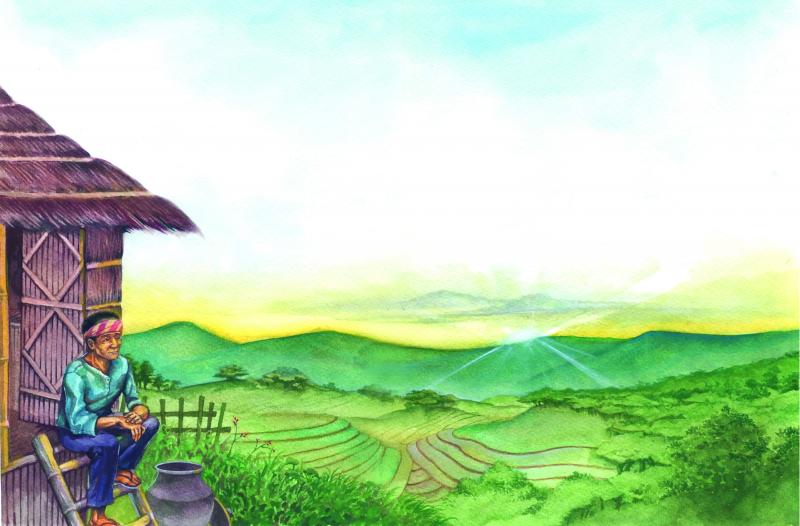Engkag: A Quiet Man Of Mindanao
By Sr Ita Hannaway SSC
To be in Engkag’s company for any length of time is to be called to inner quietness. In all the eight years I’ve known him I have never seen him lose his serenity, even when circumstances were treating him harshly, as they often did.

Tribal leader
Engkag Pangpang is a Subaanen beli’an, ie, cultural and religious leader of the tribal people to which he belongs. True to the nature of his calling, he is gifted with the power of prayer, of healing, of judging and of what I call “seeing.” In the district where he lives, it is he who is called upon to carry out the rituals or ceremonies which, as part of Subaanen culture, accompany the people’s lives from birth through death.
Meaningful ritual
Suk Penagay, which greets the new baby three days after its birth, or at the latest before it is taken outside the house; Su Kanubata, the great ritual which prepares the child for life as a Subaanen; Sug bela’i, the beautiful wedding ceremony that proceeds through many symbolic stages during the night until the happy bride and groom reach their new residence; Sungak Pekanu dingag Minatay, the eight rituals that begin when a Subaanen dies and which end a year after the death.
In addition to the ceremonies relating to the lives of the people, there are also solemn rituals which accompany each step of caring for the land from the Pekanu Pailis, which precedes the clearing of the ground before planting, until the grand festivity of Beklug, the wonderful thanksgiving ceremony when harvesting is finished. Insofar as is possible, Engkag is present to officiate at these rites.
There when needed
As well as being available for the foregoing, he is called upon whenever his neighbors have serious trouble. It may be that a child has a recurrent illness, or there may be persistent disquiet in a home. Again, there may be a new house to be blessed before being occupied – whatever the need, the Subaanens know that their beli’an will help them.
Engkag knows every precious detail regarding the proper procedure for each ceremony. He is careful that each is carried out at the time appropriate to its purpose. I have seen him ready to bless a small house at dawn. Before night had gone he was standing apart, facing east, in order to see the very first thread of the new day’s light. Then he began the blessing. When he had finished the sun was just up, sending its rays through the trees to touch the new house – the signs that light, ie, goodness, would grace this new dwelling.
Tranquil spirit
What strikes one is the aura of quietness which surrounds his rituals. One senses God’s presence and is affected by Engkag’s reverence and quiet voice as he offers his prayers. At such times, too, his bearing takes on a certain formality, which conveys the sacredness of what he is about.
This beli’an is amongst the poorest of his tribe in the district of Midsalip where the Columban Sisters are missioned. He is often lacking in sufficient food and if he happens to procure the latter he will give the most of it to his grandchildren who, for a great part of every year, experience the scourge of hunger. He possesses a minimum of clothing. His little house contains virtually nothing apart from the space where he sits or sleeps. He treads very lightly on land which once was his but was given to new settlers together with deeds, etc. (Subaanens hold land as a tribe, not as private owners, hence their land may be treated as “free land” by the civil authorities.)
Sound of his silence
When Engkag visits it is to sit still at first, not demanding conversation yet certain that he is welcome. Later he will make known his errand if he has one. I have known him, in the morning after his wife’s burial, to come in and just sit quietly for several hours before making his way home. This was his way of dealing with his loss, or perhaps of accompanying in spirit the spirit of his wife as it set out on its journey to Baya, the place where, according to Subaanen belief, the spirits of the good will rest.
In the mission of living amongst the Subaanen tribal people, sharing with them, being enriched by their cultural beliefs while being respected for my own faith, I have, I believe, experienced much of the Kingdom of God of which each of us is a part.
Seeing what is beyond
Engkag, who would not call himself a Christian, has laid hold in his life of the heart of the Beatitudes. He exemplifies the poor in spirit, the meek, the merciful and the gentle of heart. I have said that he has a gift of seeing much more than is visible to most of us – that which would prove harmful and that which would be beneficial to the deep, personal well-being of his people. His reverence for life, in nature as well as in humanity, prompts me to believe that in them he sees something of the great grandeur of God.
Salamat sa Far East
